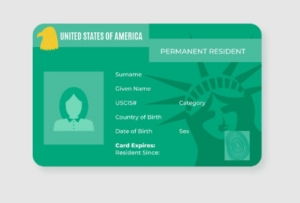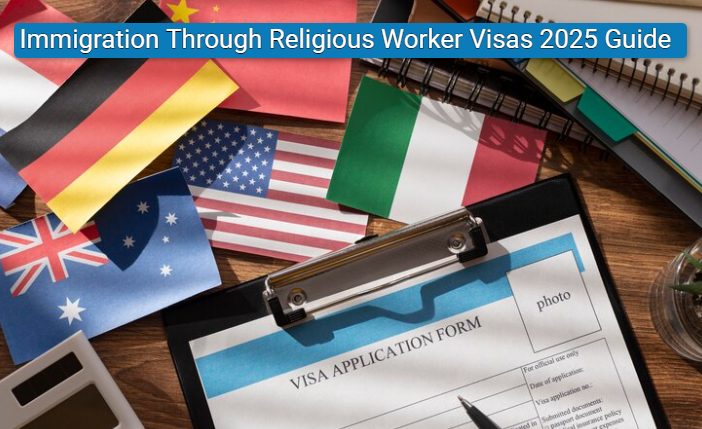Introduction to Religious Worker Visas
Religious worker visas provide a way for ministers and other religious workers to enter the United States legally. Now, in 2025, the United States immigration system provides temporary and permanent options for individuals employed in religious occupations or callings. It is important to understand the particular religious visa requirements before starting the application.
In this guide, you will learn all about qualifying, applying, and converting from an R1 visa to a green card, including current fees, timelines, and crucial eligibility information.
What is an R-1 Visa in the USA?

The R-1 visa is a nonimmigrant visa that permits religious workers to enter the U.S. temporarily. It is intended for individuals who will be working at least 20 hours a week for a non-profit religious organization, or an organization affiliated with a religious denomination.
In simple terms, if you are a minister, someone who has a religious calling (like a nun, monk, or religious brother/sister), or employed in a religious profession (like religious education, music, or administration), you may be eligible.
Important facts about the R1 visa in the USA:
- Validity: 30 months (2.5 years), with the possibility of an extension up to 5 years maximum.
- Filing Fee: Form I-129 Petition fee is $460 (as of 2025).
- Premium Processing: Available for R-1 visas with an extra $2,805 fee (15 calendar days processing).
- Site Visit: USCIS must conduct a successful onsite inspection of the religious organization’s facility before approval.
Non-Minister Religious Worker Explained
Not every religious worker is a minister. Most applicants fall under the non-minister religious worker category.
Who is a non-minister religious worker?
- Religious instructors
- Religious counselors
- Cantors
- Religious translators
- Religious education workers, missionary work, and religious healthcare workers
You still need to work in a religious vocation (nonsecular job) and comply with the religious visa USA requirements.
Important 2025 Note: The Non-Minister Special Immigrant Religious Worker Green Card program (EB-4) has a sunset provision — reauthorized by Congress periodically. Always check the latest updates with USCIS.
Eligibility for an R-1 Visa

To be qualified for an R1 visa to the USA, both the religious organization and the worker must meet certain criteria:
Religious Organization Must:
- Be a legitimate nonprofit religious organization within the United States.
- Hold IRS 501(c)(3) tax-exempt status.
- Have a qualifying religious organization (church, mosque, synagogue, temple, etc.).
- Provide a genuine religious position to the applicant.
Religious Worker Must:
- Belong to a religious denomination that has a legitimate nonprofit religious organization within the U.S. for at least 2 years preceding the application.
- Work at least 20 hours every week.
- Be a minister, have a religious vocation, or work in a religious profession.
- Qualify under the visa R1 requirements, like education, ordination, or religious experience documentation.
How to Apply for an R-1 Visa (2025 Process)
Check out this step-by-step, easy guide for how to apply for an R1 visa in 2025:
1. Employer Submits Form I-129
- Submission of Form I-129 to USCIS.
- I-129 Filing Fee: $510
- Asylum Program Fee: ($600, $300 for small employers, and $0 for non-profits)
- Optional Premium Processing Fee: $2,805 for expedited 15-day decision.
2. USCIS Site Visit
- USCIS will visit the religious organization to verify physical premises and operations.
3. USCIS Decision
- Approval notice (I-797) is issued.
4. Consular Processing or Change of Status
- If abroad: Complete the DS-160 online and attend the visa interview.
- If already in the U.S.: File a change of status application.
Documents Needed:
- Evidence of tax-exempt status.
- Letter from a religious organization.
- Proof of membership for 2 years.
- Proof of qualifications (ordination, training certificates).
R-1 Visa Jobs: What Types of Jobs Qualify?
Here’s what is included:
- Minister or clergy
- Religious instructors, catechists
- Liturgical workers
- Religious translators or broadcasters
- Religious counselors
Jobs such as janitors, clerical workers, or fundraising personnel are not considered unless directly related to religious activities.
Timeline and Processing Time for R-1 Visa (2025)

- Regular Processing: About 6 to 10 months, depending on the workload of the service center.
- Premium Processing: 15 business-day decision for an additional $2,805.
Remember:
- If premium processing is utilized, USCIS may still make a site visit, but your petition may be processed more quickly.
- Standard R-1 visas don’t necessarily need an interview at consulates, unless they later travel abroad and want to re-enter the U.S. on an R-1 visa.
Changing from an R-1 Visa to a Green Card (EB-4)
If you are already in the U.S. on an R-1 visa and need a green card, you’ll be processed through the EB-4 special immigrant religious worker process.
Disclaimer: This category is maxed out for FY2025, so applicants wanting to move forward with an I-485 in this category will have to wait until Oct 1 2025.
It is referred to as moving from r1 to a green card and has very strict rules:
R-1 Visa to Green Card Requirements (2025):
- Must have been employed full-time (at least 35 hours a week) in the U.S. in a qualifying religious occupation for 2 continuous years.
- Work must be for the same denomination sponsoring the green card.
- File Form I-360, Special Immigrant Petition first.
- File Form I-485 Application to Adjust Status after approval if already in the U.S.
- If outside the U.S., undergo consular processing at an American embassy.
Key Differences Between R-1 Visa and EB-4 Religious Worker Green Card
Understanding the distinction between the R1 visa in the USA and the EB-4 religious worker categories is important:
| Feature | R-1 Visa | EB-4 Green Card |
|---|---|---|
| Type | Temporary Nonimmigrant | Permanent Immigrant |
| Validity | Up to 5 years total | Indefinite (Permanent) |
| Work Requirements | 20+ hours per week | Full-time (35+ hours per week) |
| Form Used | I-129 | I-360 (and I-485 or DS-260) |
| Premium Processing Available | Yes (15 days) | No (only regular processing) |
| Pathway to U.S. Citizenship | Indirect (via green card later) | Direct (after green card approval) |
Applying for a religious visa through the EB-4 category is a preferable choice if you desire to live in the U.S. permanently.
What if My Religious Visa Is Denied?
If your visa for religious workers is rejected, you have the following options:
-
File an Appeal or Motion to Reopen
(Use Form I-290B within 30 days.)
-
Refiling
(Correct errors and resubmit a stronger petition.)
-
Alternative Visa Paths:
- B-1 for Religious Activities (short visits)
- H-1B (if the religious organization is eligible for the academic or cap-exempt category)
- F-1 (study and subsequent adjustment through religious employment)
-
Consular Processing:
(If Adjustment of Status is not possible within the U.S.)
Religious Worker Green Card Processing Time 2025

Due to demand, religious workers’ green card processing time may vary.
Average Timelines (as of April 2025):
- Form I-360: 12–18 months (depending on Service Center)
- Form I-485: 8–16 months upon I-360 approval
- Consular Processing: 6–12 months
Key Tip: EB4 religious worker retrogression does occasionally occur — that is, if the yearly visa quota is met, you’ll need to wait for your priority date to become current. In fact, r ight now, the visas in the EB-4 category have already been allotted for the remainder of FY2025. After FY2025, check the USCIS Visa Bulletin each month!
Ready to Begin Your Religious Worker Immigration Process?
At Passage Law, we specialize in guiding religious workers from visa applications to U.S. permanent residency. Book your personalized consultation today and move forward with confidence!
DISCLAIMER: This article offers general legal information, not legal advice. Do not rely upon this information without seeking legal counsel. If you need legal advice, you may contact us directly to speak with an attorney. We disclaim all liability with respect to actions taken based on any information presented. Every case is different and outcomes will vary depending on the unique facts and legal issues of your case.







